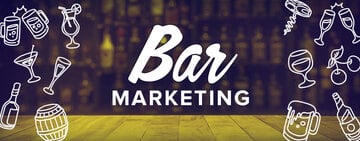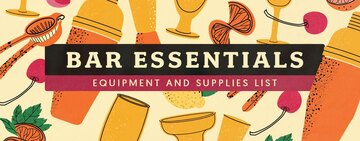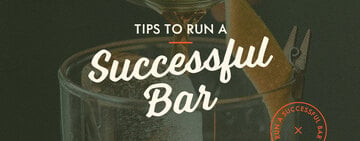Sober Night Life: Why Non Alcoholic Bars Are the New Hotspots
It’s well-known that alcohol can negatively affect your health, posing a challenge for health-conscious consumers seeking the social scene of bars while avoiding or limiting consumption. Enter the sober bar. A top bar industry trend, sober bars are establishments that serve non-alcoholic beverages and focus on providing safe and enjoyable environments for people who choose not to drink. Explore the world of socially conscious nightlife, including sober bar models and ingredients, along with the movements driving them.
What Is a Sober Bar?

Also known as nonalcoholic bars and zero proof bars, sober bars are social spaces that serve specialty nonalcoholic cocktails and beverages. The first sober bars, like The Brink in Liverpool, England, were created to offer nightlife experiences to those recovering from substance abuse. But that was back in 2011. Today, the rise of sober bars marks a larger trend toward health and wellness. Many sober bar menus aren’t filled with sugar-laden virgin daiquiris and pina coladas. Instead, their zero proof drinks often use health-boosting ingredients like kombucha, botanicals, and house-made bitters.
Zero Proof Bar Benefits
With a focus on events, health, and community, zero proof bar owners have the opportunity to create an equitable space for people to socialize and connect without the pressure to drink alcohol. Discover the top benefits of opening a sober bar below:
- Create Community - As a sober bar owner, you can position your business as an event center and partner with other local businesses. Sober bars exist to build communities where people can engage with each other unencumbered by booze. From classic gatherings like live music and trivia nights to yoga and art classes, sober bars are great spaces to build community.
- Cater to Health-Concious Patrons - As we see an ongoing trend towards health and wellness, sober bars are uniquely positioned to attract health-minded patrons. Offering menus that cater to plant-based diets and working natural supplements into zero proof cocktails can set your sober bar apart.
- Less Liability Risks - Alcohol consumption can impair judgment and coordination, leading to accidents and injuries. If patrons don’t drink in moderation or have a designated driver, it can lead to DUI incidents and driving accidents. By eliminating alcohol, sober bar owners have fewer liability concerns.
- Advertise as an Ideal First Date Location - Sober bars can advertise themselves as an ideal location for blind and first dates since they're open in the evening and provide a “going out” experience but can be less intimating than traditional nightlife spots. Meeting someone for the first time in a traditional bar setting can be daunting, especially since dating apps have made first dates with total strangers the cultural norm. Even without alcohol, sexual harassment and assault are still possible, and sober bar owners should still develop an angel shot system to extricate patrons from harassment situations. This is especially important for female-identifying persons, who are disproportionately affected by sexual assault and violence.
Sober Bar Drinks
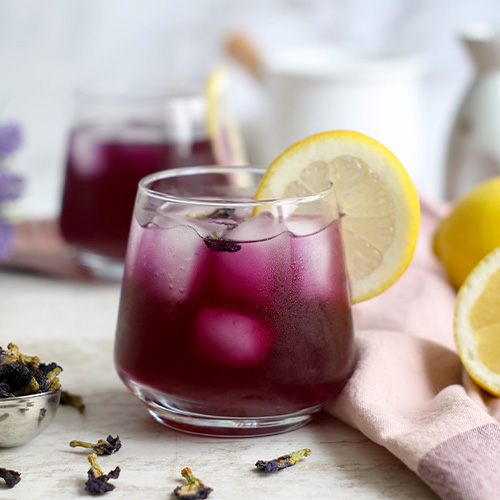
Sober bar beverage menus incorporate a variety of ingredients ranging from zero proof liquors and adaptogens to cava. Let's take a closer look at popular sober bar drinks and ingredients:
- Zero Proof Liquor - One way to create sober bar drinks is by using zero proof liquor. These non-alcoholic spirits are designed to mimic the flavor and complexity of traditional liquors but without the alcohol content. This means that guests can enjoy the taste of their favorite cocktails without the buzz.
- Alcohol-Free Cocktails - For those looking for healthier options, many sober bars offer specialty mocktails (non-alcoholic mixed drinks) made with fresh juices, herbs, and spices. These drinks can be just as flavorful and satisfying as their alcoholic counterparts but without the added calories and hangovers. However, you won’t see many sober bars calling their mocktails by that name. The term “mocktail” suggests a knockoff version of a luxury item. Sober bars believe their specialty drinks are experiences unto themselves, not shadows of their alcoholic counterparts.
- Kava and Kratom - Two other non-alcoholic options that are gaining popularity in the sober bar scene are kava and kratom. Kava is a plant-based drink that is said to have calming and anxiety-reducing effects. Kratom is a tropical tree that is used for its pain-relieving and mood-boosting properties. Both can be consumed in the form of teas or tinctures.
- Non-Alcoholic Beer and Wine - Of course, no sober bar menu would be complete without non-alcoholic beer and wine. These drinks have been around for decades, but recent advancements in brewing and fermentation techniques have led to a wider variety of flavors and styles. From hoppy IPAs to crisp chardonnays, there is a non-alcoholic option for every taste preference.
- Adaptogen Drinks - Adaptogens are herbs and mushrooms that help the body adapt to stress and promote overall wellness. They've been used for centuries in traditional Chinese and Ayurvedic medicine, and now they're making their way into the world of cocktails. Adaptogen drinks can be made with a variety of ingredients, such as ashwagandha, reishi mushrooms, and maca roots.
- Tea Cocktails - These drinks are made by infusing tea with herbs, fruits, and spices, and then adding in other non-alcoholic ingredients for flavor and texture. The result is a complex and flavorful drink that can be just as sophisticated as any alcoholic cocktail. There are countless tea cocktails to choose from, each with its unique flavor profile. For example, a basil green tea cocktail could be made with egg white, brewed green tea, basil syrup, lemon juice, and pineapple juice. Or, a hibiscus tea cocktail could be made with hibiscus tea, ginger beer, lime juice, and a sprig of fresh mint. Outside of sober bars, tea cocktails are also popular menu items at tea bars.
Types of Sober Bars
While some zero proof bars operate as completely alcohol-free spaces, many traditional bars are choosing to expand their nonalcoholic offerings to cater to more guests without forgoing their classic bar menus. Learn how hospitality operators are managing the trend towards sober nightlife by browsing the different types of sober bars.
- 0 to 100 Proof Menus - In response to the health movement, some bars choose to offer a mix of low-ABV drinks, premium zero proof beverages, and traditional cocktails. This puts the choice in the hands of the consumer to select the beverages that meet their overall social, mental, and physical goals. Unlike the lackluster nonalcoholic beers of the past, their customers will receive a high-quality beverage regardless of whether it contains alcohol. This model also helps patrons avoid binge drinking, since it’s easy to switch to a nonalcoholic option as the night progresses.
- 21 + Sober Bars - While sober bars make an attractive nightlife alternative for those not yet of legal drinking age, some owners choose to reserve their establishments for patrons over the age of 21. They want to retain the atmosphere of a traditional nightlife business and don’t want more mature patrons to avoid their business because it feels like a high school haunt. Most sober bars are highly sophisticated and appeal to professionals.
- Sober Bars with Event Spaces - Sober bars hinge on community, so many owners will have space to host events. Whether it be a stage for hosting live musicians, a dance floor, or areas to hold fitness classes, these sober bars act as event centers, tying in other local businesses and artists.
- Coffee Shop by Day, Sober Bar by Night - A popular coffee house trend is diversifying how they use their space, and sober bars are the perfect opportunity to do this. Coffee shops that traditionally close in the late afternoon are reopening in the evening as sober bars. They offer their unique nonalcoholic cocktails and other zero proof drinks during their evening service. This allows them to use their space to capture a different set of clientele and expand their sales.
Social Movements that Birthed Sober Bars
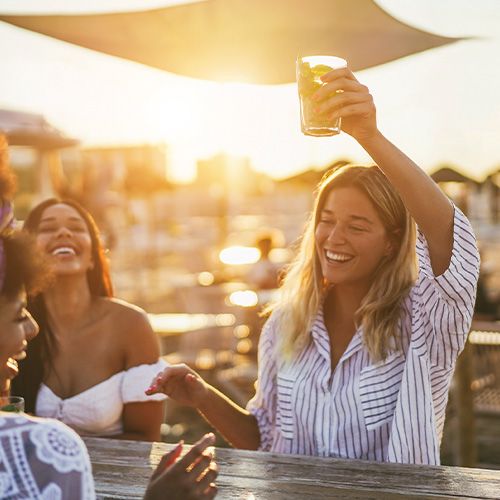
The emergence of non-alcoholic bars reflects a broader shift in society towards healthier and more mindful living. According to a recent study by Streetbees, out of the 1,700 drinking-age millennials in the U.S. recently interviewed, 1 in 2 had lessened their drinking in the past year. This trend is driven by a growing awareness of the health risks associated with excessive alcohol consumption. Many people are also embracing the sober curious movement, which encourages people to explore a sober lifestyle, and others are practicing mindful drinking.
What Is the Sober Curious Movement?
The sober curious movement is a call to question the role alcohol plays in our individual lives. The movement is not about being completely sober or giving up alcohol forever, but rather taking a break from drinking to see how it affects health, well-being, and relationships. It's a way to challenge the societal norm of drinking in social situations and explore alternative ways of socializing and having fun without alcohol.
What Is Mindful Drinking?
Mindful drinking is the practice of being aware and intentional about the amount and type of alcohol one consumes. Consuming alcohol, often in large volumes, has long been the societally accepted way to relax, celebrate, and socialize. When practicing mindful drinking, people are questioning these societal norms. Instead of complying with the expected, they’re evaluating whether each drink is serving them as individuals in their social, mental, and bodily health goals before consuming it.
Mindful Drinking vs Sober Curious
It is important to note that mindful drinking is different from the sober curious movement. While both movements involve reducing or eliminating alcohol consumption, sober curious individuals typically abstain from alcohol altogether, whereas mindful drinkers may still choose to consume alcohol in moderation.
What Caused the Sober Curious and Mindful Drinking Movements?
There are several reasons behind the rise of mindful drinking and the sober curious movement. Firstly, people are becoming more health-conscious and are looking for alternatives to traditional alcoholic beverages, as excessive drinking can lead to a range of health problems in the long term. The immediate negative effects of alcohol, such as hangovers and impaired judgment, are leading people to explore mindful drinking to mitigate these effects. Additionally, many people are becoming more aware of the negative impact of alcohol on society, such as drunk driving and alcohol-related violence. By being more intentional about their alcohol consumption, or avoiding it entirely, people can enjoy a night out without the negative consequences of excessive drinking.
Whether people are abstaining from alcohol entirely, or mindfully examining how it’s affecting them, society is shifting towards reduced alcohol consumption. We can expect to see a growing demand for nonalcoholic beverages and alcohol-free communal spaces. The hospitality industry is adapting by offering high-quality zero proof drinks and alcohol-free nightlife environments.

